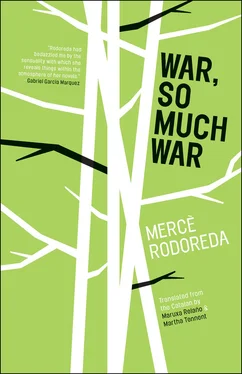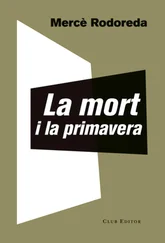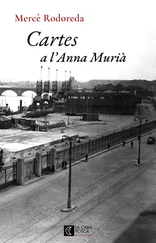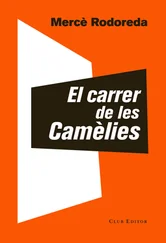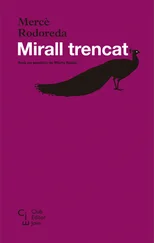Shadows suck the spirits, the soul-sap, from grass and roots. I want to see the spirits. That cannot be. The shadows also feed on defunct ants and on carcasses of oxen, which infect them with their fury. Examine yours in the moonlight, when frogs are quiet and water snakes slither across the mud. . your shadow will gild the lilies and paint the roses. When you are grown, and in the company of your shadow, you will hear the cries of unborn creatures, the breathing of the world, the screaming of the stars. My grandmother had young hands, and even on the eve of her death her eyes gleamed with mischief. She died, but could not be buried when she should have been: The casket maker was ill, and no one else in the village, or in any of the neighboring villages, could pick up a plane or a handsaw because no one knew how to take wood and turn it into a pine box. One afternoon, at that time of day when the heat is at its most oppressive, I raised the blinds after watching her for a while as she lay dead. A ray of sunlight fell on her. I stood in front of the window and let my shadow keep her company until the sun set.

I studied, I lived, I never again remembered I had once had a grandmother. I became a public defender, working for the poor,
the castaways, those who had been incarcerated for stealing a piece of bread. Always in endless conversations, endless consolations, my nose always clogged by tormented breaths, my ears filled with all the misery and misfortune of the world. The blackbird squawked three times and the man whacked it on the wing. Hush! I lived in a ground-floor lodging with three rooms, all three a pigsty, with dust and spiderwebs everywhere, rubbish never taken out on time, dishes piled on the stovetop and floor, glistening beetles, and dirty clothes strewn over chairs. One night on my way home I realized that I was walking down my street all alone. The doors were bolted, windows too. I passed a street lamp. . my shadow had vanished. I stopped short and instinctively raised an arm: The arm had no shadow. I arrived home riddled with anguish, just as the moon was coming out. I turned my back to it, and the faint glimmer of that winter moon — to see it was to believe it — deposited my own shadow at my feet. As I inserted the key I am now wearing around my neck into the lock, the shadow rested on the doorframe and I stroked it many times. I wanted it to know I loved it. I left everything: wretched prisoners, widows’ tears, orphans’ despair, killers’ remorse. . and from that day on I have lived for my shadow alone. I don’t want to ever lose it again, I want it to be mine, all mine. And that is why it should come as no surprise that, now that the moon is rising, I will take my leave of you and depart accompanied by my shadow. My back to the moon so I can see it at night, my back to the sun so I can see it by day. Farewell— Adéu .
IN FRONT OF A BOMBED-OUT HOUSE, ITS BLACKENED WALLS STILL standing, a man paced back and forth, cursing and hitting himself on the head with his fists. More than seeing me, he must have sensed my presence, for he suddenly fell silent. He was bald on top but had lots of hair on the sides, and his bushy brows met in the middle of his forehead. He sat down on a chopping block, rested his hands on his thighs and raised his head: My wife was buried this morning. Mercifully, my son went to his grandparents’ a week ago — yes, that must be why he was spared — and he doesn’t know anything about the bombing or his mother’s death. I was in the vineyard when the bomb fell. But, why? Why did they have to drop a bomb — just the one — here in this godforsaken town where there aren’t even any young people left? His voice cracked: not even that. . they just want to wreck people’s lives. A woman like her, to die beneath the rubble of her own house, alone inside the house, never having harmed a soul. . The day I die, if I go with a lucid mind, I will be thinking of her still, my Eulàlia. And — you see? — my heart aches, but I don’t feel she’s really dead. It can’t be so, I can sense her moving about, conscientious as always, scrubbing, sewing, mending, striving to keep the house as clean as a whistle, everything in shipshape order. . If it weren’t for the fact that my son is still a boy, and as good as his mother, I’d rather just die. Since I married her I have known only joy, never a moment of vexation. And that’s saying a lot. Look at these hands. Clearly the hands of a bricklayer, are they not? The skin cracked and rough from handling bricks, burnt by the cement. We built this house with our own sweat, by saving every cent we had to purchase now a sack of cement, now a couple of sacks of sand, now a batch of bricks. We spared no expense! Poor Estanislau, the plasterer, came and wouldn’t charge me for the material or the work. And Jeremies, the electrician, came and refused his wages. And Manel, the carpenter, came and donated the door and window frames. And Belloc, the painter, turned up and contributed the varnish. And then all of us, electrician, carpenter, plasterer, painter, and myself, went to work painting the whole thing — with blue shutters. Eulàlia made lunch for all of us. It was marvelous. You can’t imagine the glory of building a house from the foundations to the roof. Of seeing it go up. Of picking up a brick, slapping cement on three sides and — plop! — there you have it, ready to set. And one by one, putting up the rafters and covering them, building walls as though it were easy as pie. . Laying shingles, some belly up, others down — there — gutters and paths for the rain to sing through. He eyed me for a while and then averted his gaze. Behind me stood a thin boy, tan from being out-of-doors fighting in the war, for it was plain that that was what he had been doing: His arm was bandaged, forehead too. I, he said, weep for this man’s house and for the death of his wife. Though I’m much younger, we have always been like brothers. My name is Jeremies and I’m an electrician. I had scarcely learned the trade when I was handed a rifle, and from then on it was life in the open for me, hounded by Moors — who are as treacherous as they come — and one day, finding myself cornered without even knowing how to shoot, I pulled the trigger and a bullet came out and the Moor stumbled before falling to the ground. The fright of having killed a man sent me running, and then it was I who stumbled from two bullets that were chasing me, one of which grazed my arm, the other my forehead, and from there it was straight to the hospital, which had been bombed three times despite the white sheet with a red cross on the rooftop. . If this fellow misses putting up walls, he said, I miss doing the wiring, running the wires through the grooves, sliding them along and along so that the lightbulbs will light up. A man younger than the bricklayer and older than the electrician approached us and began speaking in a low voice, as though he were at confession. I volunteered and now I’ve lost everything: shop and tools. Tools I had bought, one by one, as an apprentice, and tools my father had given me little by little, starting with the chisel. Just ask — I had them all: hammer, saw, and handsaw. And the plane, which made shavings so delicate they resembled the ringlets on one of those giant female figures we parade around in processions. . always planing doors that don’t fit or shutters that are too large, so that everything will open and close properly, everything will work as it should. . When I mentioned that I had a carnation field they said that that was all well and good but it was more important to have a vegetable garden, especially in wartime, when you never know if there will be anything to eat the following day. This war is a terrible calamity, can anyone tell me why we are fighting? The bricklayer said it was to beat back the enemy, but then the carpenter pointed out that, to our enemies, we are the enemy. The electrician said: Even if we win this war it’ll be as though we’ve lost it, the way a war is set up, everyone loses. The hearth builder joined us and said that we could cry all we wanted and there would still be nothing to plow, we were all cannon fodder, nothing but cannon fodder. The bricklayer raised his head. Three men were coming our way pushing wheelbarrows loaded with picks and shovels and bricklayer’s hammers. They were the painter, the plasterer, and the carpenter’s son, coming to help rebuild the house. They immediately stepped inside the ruins; I did the same. Until it was dark and the bricklayer said, should we stop for supper? We all went to the church. The bricklayer lit a lantern and set it on the altar. There were no saints. The pews were piled up in a corner; the plasterer picked one up and, with the carpenter’s help, smashed it and used it to build a fire on the floor. When it’s all over I’ll make nicer pews than these. They put a pot of white beans garnished with strips of bacon on the fire.
Читать дальше
